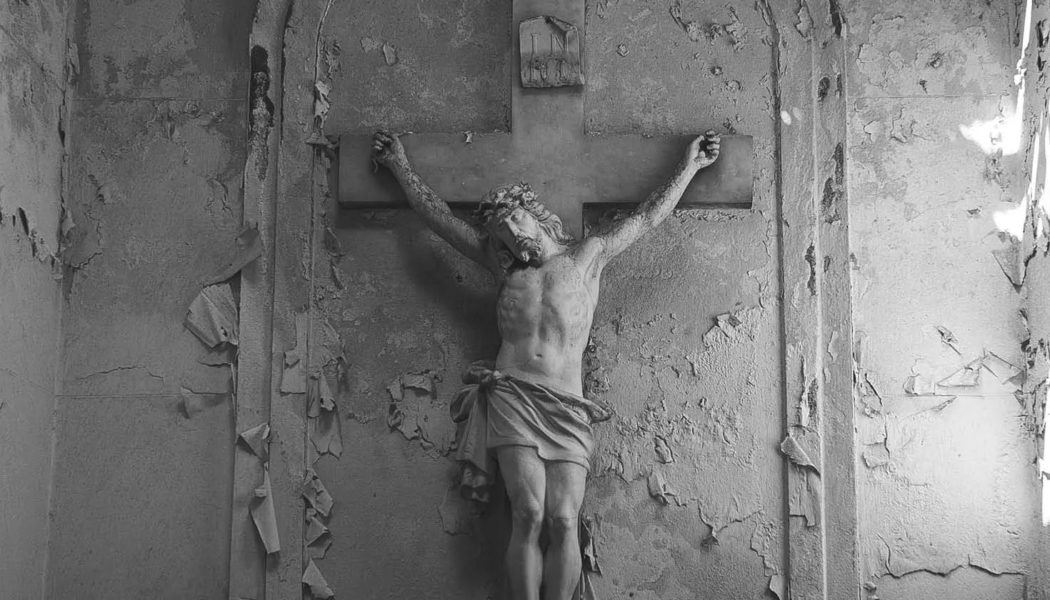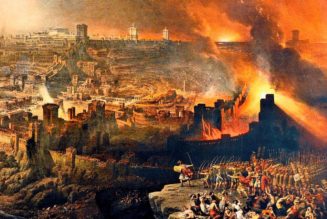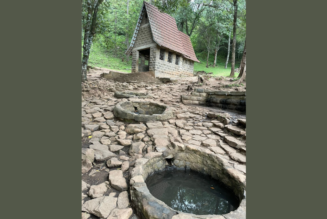
Every year in human history is a year of suffering, but in 2022, Palm Sunday of the Lord’s Passion Year C comes in the wake of a war and a pandemic bringing record levels of sickness, stress and suicide. I see it in my group of friends who are facing all three.
The Passion according to St. Luke comes just in time, describing exactly how to experience suffering. Each telling of the story of the death of Jesus has its own character. St. Mark’s passion is the most bleak, stressing the cruelty of what happened; St. Matthew’s is the most regal stressing the kingship of Christ despite it all; and St. John’s is the most theological showing the rich significance of what is going on.
St. Luke’s passion is probably the most comforting. At each stage of the story, Luke’s telling of the passion distinguishes itself from the others by telling us a little more clearly what suffering is good for.
First: Only in Luke, an angel “strengthens” Jesus — by increasing his suffering.
There is an important succession of events in the Agony in the Garden in Luke’s passion.
First, Jesus says, “Father, if you are willing, take this cup away from me; still, not my will but yours be done.” This is the Our Father prayer in action. Jesus shows us what it looks like for the Father’s will “to be done on earth as it is in heaven,” and it means preferring the will of God to everything, even if that means intense suffering.
Then, “To strengthen him an angel from heaven appeared to him.” But notice what the angel does to strengthen him. The very next line is: “He was in such agony and he prayed so fervently that his sweat became like drops of blood falling on the ground.”
Instead of relieving his suffering the angel seems to increase his suffering, such that he sweats blood.
How does suffering strengthen someone? By uniting him to the will of the Father, which is love — “the love that moves the sun and stars” as Dante has it. This is the moment in the Passion when Jesus takes all sins onto himself out of love. That includes all the sins we have heard about in the past several Sundays: The sins of the Galilean rebels, the sins of every prodigal son and every jealous sibling, the sins of the man and woman caught in adultery, and the sins of the Pharisees who wanted to punish the woman but not the man.
But it also includes both the worst sin you ever committed in your life and the worst sin every committed against you in your life. The sins that gnaw at you and accuse you even after all these years — Jesus took those onto himself in the garden, too, out of love, such that the memory of our sin is the meeting place where we find Jesus, who made himself guilty and descended into hell for us.
And that is why, to this day, there is enormous grace available in enormous pain: Because Jesus Christ transformed it. Great sadness forces us to rely on God more as it strips away what we relied on before. Crushing disappointment makes us ask hard questions we have been avoiding, leading to important answers we would never find any other way.
Father William Watson’s Sacred Story program and Forty Weeks Ignatian method is designed to help souls see the darkest deeds in their memory as incidents Christ allowed so that he could deliver special graces, just as he entered the story of Passion Sunday to give us our Easter Sunday. In Jesus, says Father Watson, “My life’s greatest tragedies can be transformed into my life’s greatest blessings.”
Second: Only in Luke, God heals the ear of the sufferer.
All four Gospels mention that Peter (usually unnamed) cuts off the ear of the high priest’s servant Malchus (also usually unnamed) in the garden when the soldiers come. Only in Luke do we learn that Jesus “touched the servant’s ear and healed him.”
This is hugely significant. We have heard Jesus say that the real meaning of the Gospel is there only “for those who have ears to hear.” Given that, it isn’t hard to see the meaning of a story where the rash action of a disciple literally causes someone to lose his ear: When a Christian mistreats a non-Christian, he cuts off his ability to share the Gospel — our misdeeds make people deaf to our words.
But in Luke, when Jesus heals the ear, he teaches a different lesson. He shows that Jesus enters our suffering and gives us the ability to hear him through it. That is how this plays in The Passion of the Christ film, where the slave Malchus loses his ear, filling the world with a ringing noise that drowns out all else, until Jesus heals him. Then, he gains faith along with a new ear.
Sunday’s First Reading, from Isaiah, spells out the connection between hearing God and accepting suffering: “Morning after morning he opens my ear that I may hear; and I have not rebelled, have not turned back. I gave my back to those who beat me, my cheeks to those who plucked my beard; my face I did not shield from buffets and spitting.”
When we suffer, we pray for healing, but Jesus gives us hearing instead. Suffering gives us the ability to listen to him, sometimes for the first time in our lives.
Third: Only in Luke, Jesus teaches the daughters of Jerusalem about suffering and repentance.
Only in Luke do we hear that “A large crowd of people followed Jesus, including many women who mourned and lamented him,” and that he spoke to them, saying: “Daughters of Jerusalem, do not weep for me; weep instead for yourselves and for your children for indeed, the days are coming when people will say, ‘Blessed are the barren.’ … They will say to the mountains ‘Fall upon us!’ And to the hills ‘Cover us.’”
Jesus is describing events that are about to befall Jerusalem, where the Temple will be destroyed and the city besieged not long after Jesus’s death. That’s fascinating, because it connects the Passion to the destruction of Jerusalem. But we can’t help but notice that he is also speaking of the dire times we are experiencing in the 21st century — when we are sterilizing ourselves en masse, destroying unborn children by the millions, and, in the West, hiding our faith from the world.
And in our time, via Our Lady of Fatima, the Lord keeps giving us the same warning to repent, saying, “Weep for yourselves and for your children … for if these things are done when the wood is green what will happen when it is dry?”
The Catechism describes how our sins make us guilty in exactly the way the people of Jerusalem were guilty:
“We must regard as guilty all those who continue to relapse into their sins. Since our sins made the Lord Christ suffer the torment of the cross, those who plunge themselves into disorders and crimes crucify the Son of God anew in their hearts (for he is in them) and hold him up to contempt.”
One kind of suffering is made by our sins, and the only way out is repentance.
Fourth: Only in Luke, Jesus’s words from the cross show the fruit of repentance.
Only in Luke do we hear Jesus say, “Father, forgive them, they know not what they do,” and this prayer is answered almost immediately in another passion detail only Luke shares: the story of “the good thief.”
One of the two thieves being crucified with Christ silences the mockery of the other, telling him: “Indeed, we have been condemned justly, for the sentence we received corresponds to our crimes, but this man has done nothing criminal.”
Then he says to the Lord, “Jesus, remember me when you come into your kingdom.”
Jesus replies: “Amen, I say to you, today you will be with me in Paradise.”
This completes the Lucan lessons on suffering. It started when he said, “I have eagerly desired to eat this Passover with you before I suffer.” It continued as Christ joined our suffering in the garden, then gave us ears to hear him in our suffering. He called us to repent, then showed us how. If we do, we will live with God forever in paradise.
Last comes the cosmic significance of the event, in final words of Jesus, only found in Luke.
“Father, into your hands I commend my spirit,” Jesus says.
And with that, he destroys our sins with his death and makes suffering our way to the Father.
St. Paul says “he humbled himself, becoming obedient to the point of death, even death on a cross,” and “God greatly exalted him and bestowed on him the name which is above every name, that at the name of Jesus every knee should bend, of those in heaven and on earth and under the earth, and every tongue confess that Jesus Christ is Lord, to the glory of God the Father.”
The name of Jesus and his path of humility and obedience, is ultimately the only answer to the problem of suffering. What hurts us most helps us most, because only there do we discover that there are wounds so great we can never heal them. Only Jesus can. And does.
Join Our Telegram Group : Salvation & Prosperity









